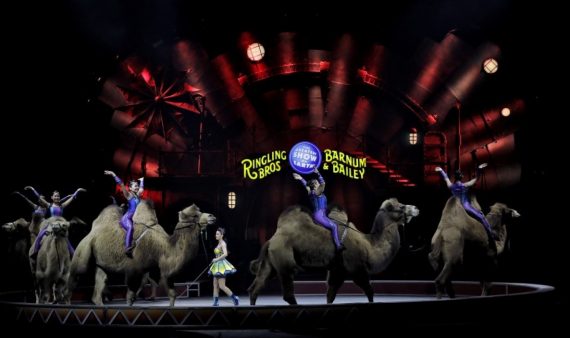Ringling Brothers Circus To Shut Down After 146 Years In Business
A long-standing staple of American culture will soon be no more.
The most well-known traveling circus is shutting down this year after 146 years in operation:
Ringling Bros. and Barnum & Bailey circus announced on Saturday night that after 146 years of performances, it was folding its big tent forever.
In a statement on the company’s website, Kenneth Feld, the chief executive of Feld Entertainment, the producer of Ringling, said the circus would hold its final performances in May. He cited declining ticket sales, which dropped even more drastically after elephants were phased out from the shows last year.
“This, coupled with high operating costs, made the circus an unsustainable business for the company,” the statement said. “The circus and its people have continually been a source of inspiration and joy to my family and me.”
Stephen Payne, a spokesman for Feld Entertainment, said in an interview on Saturday night that the closing would affect about 400 cast and crew members.
“We looked at the performance in 2016 and advance tickets sales in 2017, and we decided it was not a viable business model,” he said.
The company informed employees Saturday night after shows in Orlando, Fla., and Miami.
“There isn’t any one thing,” Mr. Feld told The Associated Press. “This has been a very difficult decision for me and for the entire family.”
Ringling has two touring circuses this season and will perform 30 shows between now and May. Major stops include Atlanta, Boston, Philadelphia and Washington. The final shows will be on May 7 in Providence, R.I., and on May 21 at the Nassau Veterans Memorial Coliseum in Uniondale, N.Y.
The final appearance of the circus in New York City will be from Feb. 23 to March 23 at the Barclays Center in Brooklyn.
An estimated 10 million people go to a Ringling circus each year.
Mr. Feld told The A.P. that transporting the show by rail and other circus quirks — such as providing a traveling school for performers’ children — are throwbacks to another era. “It’s a different model that we can’t see how it works in today’s world to justify and maintain an affordable ticket price.”
The Feld family bought Ringling in 1967.
As the The Washington Post notes, Ringling Brothers and other circus have been the focus of various animal rights groups for some time now due to alleged harsh treatment of the animals featured in the shows, especially the elephants, and those groups are generally pleased with this development:
People for the Ethical Treatment of Animals, a longtime opponent of the circus, wasted no time in claiming victory.
“After 36 years of PETA protests, which have awoken the world to the plight of animals in captivity, PETA heralds the end of what has been the saddest show on earth for wild animals, and asks all other animal circuses to follow suit, as this is a sign of changing times,” Ingrid Newkirk, president of People for the Ethical Treatment of Animals, wrote in a statement.
Wayne Pacelle, president and CEO of The Humane Society of the United States, acknowledged the move was “bittersweet” for the Felds but said: “I applaud their decision to move away from an institution grounded on inherently inhumane wild animal acts.”
In May of 2016, after a long and costly legal battle, the company removed the elephants from the shows and sent the animals to live on a conservation farm in Central Florida. The animals had been the symbol of the circus since Barnum brought an Asian elephant named Jumbo to America in 1882. In 2014, Feld Entertainment won $25.2 million in settlements from groups including the Humane Society of the United States, ending a 14-year fight over allegations that circus employees mistreated elephants.
By the time the elephants were removed, public opinion had shifted somewhat. Los Angeles prohibited the use of bull-hooks by elephant trainers and handlers, as did Oakland, California. The city of Asheville, North Carolina nixed wild or exotic animals from performing in the municipally owned, 7,600-seat U.S. Cellular Center.
Attendance has been dropping for 10 years, said Juliette Feld, but when the elephants left, there was a “dramatic drop” in ticket sales. Paradoxically, while many said they didn’t want big animals to perform in circuses, many others refused to attend a circus without them.
“We know now that one of the major reasons people came to Ringling Bros. was getting to see elephants,” she said. “We stand by that decision. We know it was the right decision. This was what audiences wanted to see and it definitely played a major role.”
The Felds say their existing animals — lions, tigers, camels, donkeys, alpacas, kangaroos and llamas — will go to suitable homes. Juliette Feld says the company will continue operating the Center for Elephant Conservation.
Some 500 people perform and work on both touring shows. A handful will be placed in positions with the company’s other, profitable shows — it owns Monster Jam, Disney on Ice and Marvel Live, among other things — but most will be out of a job. Juliette Feld said the company will help employees with job placement and resumes. In some cases where a circus employee lives on the tour rail car (the circus travels by train), the company will also help with housing relocation.
Kenneth Feld became visibly emotional while discussing the decision with a reporter. He said over the next four months, fans will be able to say goodbye at the remaining shows.
A bigger factor than the animal rights group in the decision to bring an end to a business that lasted a nearly a century and a half seems to be something that other forms of entertainment have had to factor into their business models in recent years, namely the fact that thanks to the Internet and other sources the forms of entertainment vying for the attention of the American public has vastly expanded from what it used to be in the past. From movies and television, which now includes broadcast, cable, and streaming media in various forms, to the Internet itself as well as various forms of sports and other after-school and weekend activities for children, there is far more for the average American to see and do than there used to be in the past. For that reason, it’s no longer a big deal when the circus, whether its Ringling Brothers or any of the other smaller touring circuses that make their way around the country, comes to town. Factor into that increased costs associated with live entertainment such as circuses and you have a plethora of reasons why business has likely slowed down. Add into that the fact that the costs of operating a circus that travels the country by train essentially year-round has likely become more and more expensive to operate as the years have gone on.
I’d like to say that I have fond memories of the Ringling Brothers circus, but I really don’t. As far as I can remember, I don’t think I ever went to see it when it was in town in New York City every year and I have no memory of ever going to the traveling circus that would come through my hometown every summer. It’s not like I didn’t grow up in a family that did such things, because we often went to New York to see things such as Disney On Ice and other events like that and I’ve been to plenty of zoos, including the Bronx Zoo in New York as well as zoos in San Diego and Los Angeles and Sea World in Florida. When I got older we would go into the city to see a number of Broadway musicals that were popular in the 70s and 80s. For some reason though, we never went to the circus even though I knew exactly what it was as a kid and, of course, who P.T. Barnum was. (Indeed, I remember going to see the musical based on Barnum’s life when it was on Broadway.) So I can’t say that this is hitting me personally in any sense. Nonetheless, there is no small degree of significance in the fact that an institution that goes back nearly to the final years of the Civil War will be gone in a matter of months.






I believe my wife gets credit for an assist on this, though it was not her goal in writing The One And Only Ivan.
I never like to see anyone lose a job. This was a way of life for these folks, and it’s sad at that level. But insofar as a circus is in many ways just a slightly more humane version of bear-baiting, and given that Cirque du Soleil has already figured out how to modernize the concept, it’s time to say good-bye to Ringling Brothers.
Cirque du Soleil, which has no animal acts whatsoever, earns $850 million a year, so this is clearly not true.
The White House will be enough of a circus, one imagines Ringling Brothers didn’t see any way to compete.
Also, good. I’m generally against the use of animals for human entertainment – ala Sea World, etc.
My father was clearly ahead of his time. When I was about nine years old, he complained about taking me to the circus because “it is always the same.” There simply too many novel entertainment venues. The man on the flying trapeze can’t compete with VR.
…against the use of animals for human entertainment…
Oui!
https://www.youtube.com/watch?v=R_fUsssnHPw
(Trigger Warning: Beware the White Idiots!)
@Tony W:
Indeed. On January 20, the biggest clown in or out of the circus will take office.
The circus seemed outdated even when I was a kid. They should have gotten rid of the clowns before they got rid of the elephants, though. It might have bought them another 10 years.
I agree with Michael’s observations above that you hate to see anyone lose his or her job. But tastes change, especially in entertainment, and it was time for RBB&B to go.
I think I remember seeing it once or twice as a kid. I was mildly interested in circuses because I’ve been a juggler since I was 11. Of course, most jugglers these days work independently rather than as part of a circus.
@Kylopod: In Brazil it´s common to see people juggling on traffic lights, then they ask people in the cars for money.
@Mr. Bluster: I see deconstruction is alive and well. Loved the link! 😉
@Tony W:
Really? Humans are animals, and more are injured providing entertainment every year than other animals, by far.
Not the only elephant act headed up by touts that should go by the wayside.
While I am extremely opposed to animal cruelty, I also have to wonder exactly what PETA’s vision for the future of large domesticated animals might be. Freeing horses, pigs, cattle, sheep, reindeer, camels, Indian elephants, etc. into the wild would generally be disastrous, both for the animals themselves and for the environment. Keeping them as pets isn’t practical. If they can’t earn their keep by providing meat, milk, leather, and horsepower then they won’t be kept. Is extinction really the preferred option here — the PETA version of “better dead than Red”?
@Andre Kenji de Sousa: That’s kind of like the subway musicians in NYC.
I had to look it up.
…against the use of animals for human entertainment…
Damn it! I hope this doesn’t mean I should regret keeping Snippy, the family canary in a cage in our dining room when I was in grade school.
I remember my mom saying that the only time she heard the bird sing was when she ran the vacuum cleaner. Had to bury him in the back yard after he died.
Then there were the little turtles my sister kept in a round plastic turtle “pond” with the green plastic palm tree. She thought it would be neat to make them Indian turtles so she painted watercolor war paint on their shells. They died too.
I don’t want to even remember about the cat. It’s just too painful.
@DrDaveT: It’s a good question, but I believe there are wild versions of most of those animals. Would it really be ‘extinction’ then?
Granted, we humans (whose needs are obviously the most important thing ever) will eventually eliminate any possible place for wild animals to live, so perhaps the question is moot.
@Kylopod: I like street artists. But I don´t like ask people asking for money when I´m driving, specially in areas with higher crime stats than NYC. 🙂
@Mr. Bluster: Last I knew PETA was set against pets too..
@DrDaveT: PETA’s objectives are, if I recall correctly, pretty extreme.
I think there is a middle ground to be had, but neither consumers nor large-scale ag will like the proposals. I’d like to see better treatment of animals we consume as food–just because they are destined for the plate doesn’t mean they shouldn’t be treated decently while they are being raised. That would mean higher costs for farms, and higher protein prices (which again, isn’t a bad thing, Americans consume way more meat protein than is necessary and it’s affecting our health).
Regarding animals in the wild–we are seeing nearly 70% of the young moose population decimated in NH/Maine, due to infestations of ticks. This can probably be attributed to climate change.
On the circus: glad to see it go. I was taken as a young child and did not enjoy it at all.
It’s amazing the circus lasted as long as it did. We are a long way from a middle class that largely stayed put and needed to have entertainment (or education) brought to them. Of course the poor is still in that boat, but they could never afford the tickets, 100 years ago or now. Today, middle class families go on vacations to DisneyWorld, Sea World, Universal Studios, the Mall of America, and so on. They get on low cost flights and are there in a few hours. It astounds me that the circus, if it was still a viable entertainment, didn’t just set up permanent sites outside of Chicago, SFO and Philadelphia, basically anywhere that Southwest and JetBlue flew.
Actually no animal whose DNA we harvest will ever be truly extinct. Kill every elephant on earth and we could almost certainly grow more. Living things are essentially code, just like software.
Anyway, aren’t we bored with the same old species? Let’s fire up the CRISPR and make us some chimera!
In the next few years we’ll be able to make that happen. There’ll be an app. Grow your own anti-christ.
Last went to the circus in mid-90s with my kids. My impression then was a kind of boredom. It seemed too scripted, too machanical. Kids were just OK, not terribly excited. It was just a matter of time.
@michael reynolds:
I’m not so sure this is the scientific consensus any more. It was the (popular) consensus in the days of Dolly the sheep, but we have learned an awful lot about the importance of expression of genes, and how much the mother affects that expression during fetal development. Which is a roundabout way of saying (although I Am Not A Geneticist (TM)) I’m pretty sure we are actually farther away from recreating an extinct species than we thought we were twenty years ago.
@Guarneri:
Perhaps you are unaware of the concept of agency?
@michael reynolds:
Sounds like it would go well with a nice Chianti.
@michael reynolds: Not really man as we don’t have the technology to create a species with just a DNA snippet and we have no group dedicated to the whole preservation of the DNA of rare animals.
I used to work at an arena and Ringling Brothers always generated the most excitement. My favorite was the high wire.
I think the outmoded traveling part made for a lot of expense and work. One solution to me was to build a circus park at Sarasota and have it there. People already go to Florida by the millions anyway.
For young and old there was a certain magic and excitement: truly was the greatest show on earth!